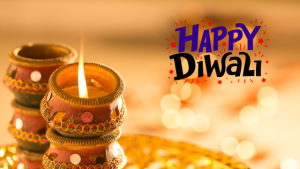 Background
Background
Diwali is called the « Festival of Lights » and is celebrated to honor Rama-chandra, the seventh avatar (incarnation of the god Vishnu). It is believed that on this day Rama returned to his people after 14 years of exile during which he fought and won a battle against the demons and the demon king, Ravana. People lit their houses to celebrate his victory over evil (light over darkness).
The goddess of happiness and good fortune, Lakshmi, also figures into the celebration. It is believed that she roams the Earth on this day and enters the house that is pure, clean, and bright. Diwali celebrations may vary in different communities but its significance and spiritual meaning is generally “the awareness of the inner light”.
Symbols
Lamps, fireworks and bonfires illuminate this holiday, as the word “Deepawali” means “a row or cluster of lights” or “rows of diyas (clay lamps)”. The festival symbolizes the victory of righteousness and the lifting of spiritual darkness. The goddess Lakshmi, who symbolizes wealth, happiness and prosperity, is also worshipped during Diwali.
Source: Text: https://www.timeanddate.com/holidays/canada/diwali Image: BSc Nursing

 ‘Turn on the light,’ – it is an expression that we hear very often. All the more so in this mid-January period when the clouds seem to be ever present and darkness more obvious in the mornings and evenings. The solution is close at hand: we switch on the electric lamps which bring the desired illumination.
‘Turn on the light,’ – it is an expression that we hear very often. All the more so in this mid-January period when the clouds seem to be ever present and darkness more obvious in the mornings and evenings. The solution is close at hand: we switch on the electric lamps which bring the desired illumination.